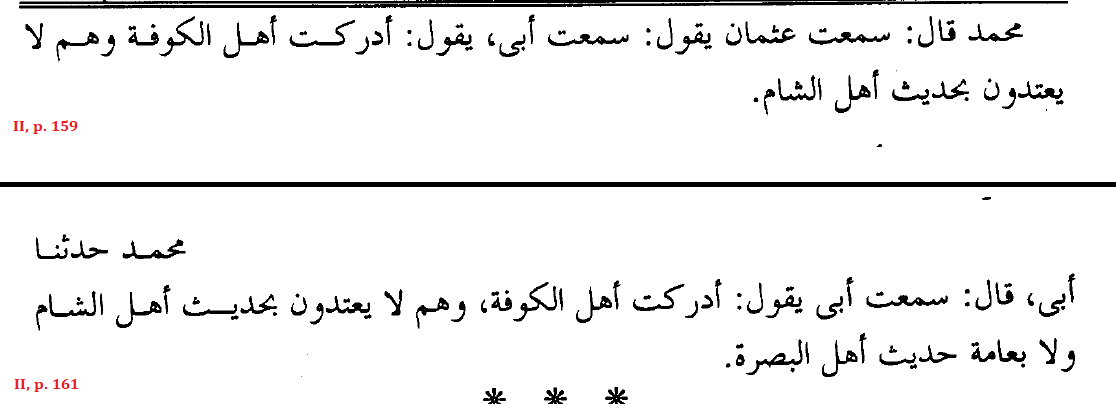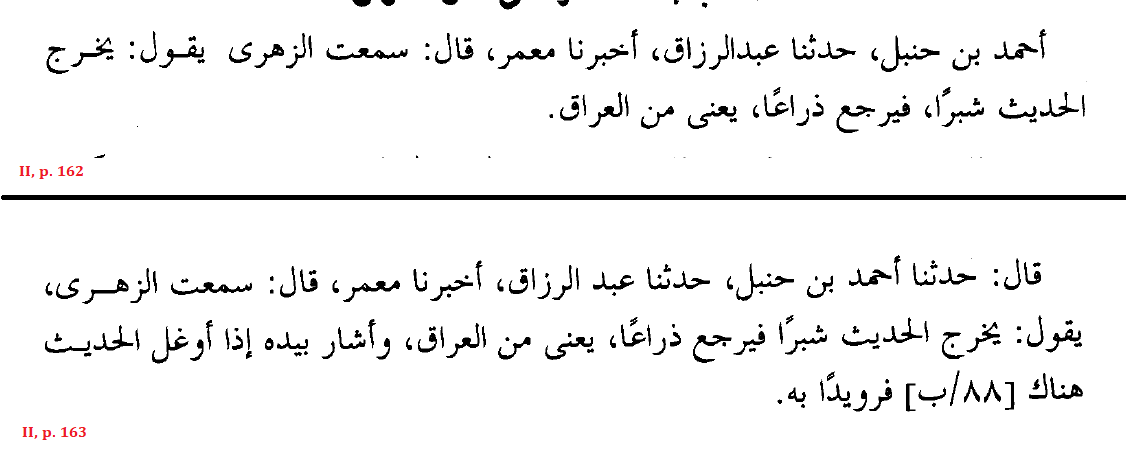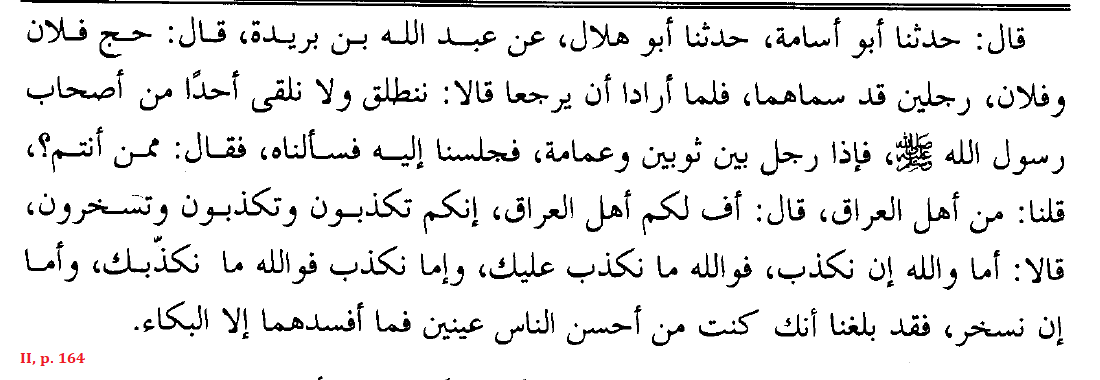I thought I would share some of the more striking quotations, ascriptions, and remarks that I have come across whilst reading this fascinating book.
I am still learning Arabic, so please feel free to correct my translations! https://twitter.com/IslamicOrigins/status/1284988926822952960">https://twitter.com/IslamicOr...
I am still learning Arabic, so please feel free to correct my translations! https://twitter.com/IslamicOrigins/status/1284988926822952960">https://twitter.com/IslamicOr...
ʾAbū Šaybah ʾIbrāhīm (Kufan traditionist): “I noticed of the People of Kufah: they have no regard for the Hadith of the People of the Levant, nor for most of the Hadith of the People of Basrah.”
Ibn al-Mubārak (Khurasani traditionist): “The Hadith of the People of Kufah were corrupted by two men: al-ʾAʿmaš and ʾAbū ʾIsḥāq.”
Al-Muḡīrah b. Miqsam al-Ḍabbī (Kufan traditionist): “Al-ʾAʿmaš and ʾAbū ʾIsḥāq corrupted the Hadith of the People of the Kufah, or corrupted the Hadith in Kufah.”
Ibn Šihāb al-Zuhrī (Madinan/Levantine traditionist): “Verily, in the Hadith of the People of Kufah, there is a lot of corruption.”
Ibn Šihāb al-Zuhrī (Madinan/Levantine traditionist): “Hadith depart the size of a handspan, then return the size of a cubit—i.e., from Iraq.”
Al-Ḥusayn al-Karābīsī (Baghdadi Hadith critic/skeptic): “Amongst those famous for deception [in their Hadith] in Kufah were ʾAbū ʾIsḥāq, al-Ḥakam, Muḡīrah, al-ʾAʿmaš, and al-Ṯawrī; and in Basrah, Qatādah; and in [regions] other than those, Hušaym, Ibn ʿUyaynah, and ʾIsḥāq.”
ʾAbū Ḥātim al-Rāzī (Persian Hadith critic): “Yaḥyá b. ʾabī Kaṯīr used to deceive [in his Hadith], and al-ʾAʿmaš, al-Ṯawrī, and ʾAbū ʾIsḥāq al-Sabīʿī used to deceive [in their Hadith].”
Ibn Šihāb al-Zuhrī (Madinan/Levantine traditionist): “Were it not for hadiths that come to us from the direction of the East, which we reject, which are unknown to us, I would never have written any hadith, nor would I have allowed anyone to write down any hadith in my presence.”
Wuhayb b. Ḵālid (Basran traditionist): “I did not see anyone [in Madinah] except for you who recognised and renounced [inauthentic Hadith], other than Mālik and Yaḥyá b. Saʿīd (i.e., al-ʾAnṣārī).”
Muʿtamir b. Sulaymān (Basran traditionist): “Do not take anything from Ibn ʾIsḥāq, for he is a liar!”
Yaḥyá b. Saʿīd al-Qaṭṭān (Basran Hadith critic): “I attest that Hišām b. ʿUrwah and Mālik b. ʾAnas attested that Muḥammad b. ʾIsḥāq is a liar!”
ʾAbū Ḥātim al-Rāzī (Persian Hadith critic): “Al-Zuhrī is more preferable to me than al-ʾAʿmaš. [But in] either case, their Hadith are usable as a proof, [at least] in regards to that which they did not deceitfully [transmit].”
Maʿmar b. Rāšid (Yemeni traditionist): “I did not see anyone in Ṣanʿāʾ who was not creating Hadith, except for Ḵallād b. ʿAbd al-Raḥmān.”
Yazīd b. Hārūn (Iraqi traditionist): “ʾAbū Hurayrah deceived [in his Hadith], and Ibn ʿUmar deceived [in his Hadith].”
A recurring charge is that of “Tadlīs”, which—in the context of Hadith—means dishonesty in transmission: suppressing undesirable tradents, pretending to hear from people who you didn’t hear from, etc.
Not surprisingly, there are some harsh remarks about this kind of deception in Hadith!
Yazīd b. Zurayʿ (Basran traditionist): “Deception [in Hadith] is [a form of] lying!”
Šuʿbah b. al-Ḥajjāj (Basran traditionist): “I would rather commit adultery than deceive [in Hadith]!”
Yazīd b. Zurayʿ (Basran traditionist): “Deception [in Hadith] is [a form of] lying!”
Šuʿbah b. al-Ḥajjāj (Basran traditionist): “I would rather commit adultery than deceive [in Hadith]!”
By contrast, the Khurasani Hadith critic Ibn Ḥibbān al-Bustī seemed resigned to this:
"And if he says, “Ḥammād used to deceive,” [then] it is said to him: “Qatādah, ʾAbū ʾIsḥāq al-Sabīʿī, ʿAbd al-Malik b. ʿUmayr, Ibn Jurayj, al-ʾAʿmaš, al-Ṯawrī, and Hušaym used to deceive...
"And if he says, “Ḥammād used to deceive,” [then] it is said to him: “Qatādah, ʾAbū ʾIsḥāq al-Sabīʿī, ʿAbd al-Malik b. ʿUmayr, Ibn Jurayj, al-ʾAʿmaš, al-Ṯawrī, and Hušaym used to deceive...
…[yet] you rely upon their transmission in your argumentation! Thus, if the deception of Ḥammād in his transmission necessitates the abandonment of his Hadith, [then] the deception of these masters necessitates the abandonment of their Hadith!”
Ibn Ḥibbān is being rhetorical – he fully expects his hypothetical opponent to concede that deception of this kind must be tolerated in Hadith.
By contrast, the skeptical Abū al-Qāsim seems to go the other way! For him, all of these great scholars are thereby suspect!
By contrast, the skeptical Abū al-Qāsim seems to go the other way! For him, all of these great scholars are thereby suspect!
I think this helps to contextualise Abū al-Qāsim a bit, although I don’t yet fully understand his methods in any detail. More research is required!
~ Fin
~ Fin

 Read on Twitter
Read on Twitter
![Ḥafṣ [b. Ḡiyāṯ al-Kūfī?]: “The People of the Levant are stupid!” Ḥafṣ [b. Ḡiyāṯ al-Kūfī?]: “The People of the Levant are stupid!”](https://pbs.twimg.com/media/EdxVQwwXsAAiywN.png)

![ʾAbū Ḥātim al-Rāzī (Persian Hadith critic): “Qatādah used to deceive [in his Hadith].” ʾAbū Ḥātim al-Rāzī (Persian Hadith critic): “Qatādah used to deceive [in his Hadith].”](https://pbs.twimg.com/media/EdxVkY8XYAAvOv1.png)





![Al-Ḥusayn al-Karābīsī (Baghdadi Hadith critic/skeptic): “Amongst those famous for deception [in their Hadith] in Kufah were ʾAbū ʾIsḥāq, al-Ḥakam, Muḡīrah, al-ʾAʿmaš, and al-Ṯawrī; and in Basrah, Qatādah; and in [regions] other than those, Hušaym, Ibn ʿUyaynah, and ʾIsḥāq.” Al-Ḥusayn al-Karābīsī (Baghdadi Hadith critic/skeptic): “Amongst those famous for deception [in their Hadith] in Kufah were ʾAbū ʾIsḥāq, al-Ḥakam, Muḡīrah, al-ʾAʿmaš, and al-Ṯawrī; and in Basrah, Qatādah; and in [regions] other than those, Hušaym, Ibn ʿUyaynah, and ʾIsḥāq.”](https://pbs.twimg.com/media/Edxalf-X0AI8ELc.png)
![ʾAbū Ḥātim al-Rāzī (Persian Hadith critic): “Yaḥyá b. ʾabī Kaṯīr used to deceive [in his Hadith], and al-ʾAʿmaš, al-Ṯawrī, and ʾAbū ʾIsḥāq al-Sabīʿī used to deceive [in their Hadith].” ʾAbū Ḥātim al-Rāzī (Persian Hadith critic): “Yaḥyá b. ʾabī Kaṯīr used to deceive [in his Hadith], and al-ʾAʿmaš, al-Ṯawrī, and ʾAbū ʾIsḥāq al-Sabīʿī used to deceive [in their Hadith].”](https://pbs.twimg.com/media/EdxatbxWsAAD8Xw.png)


![Wuhayb b. Ḵālid (Basran traditionist): “I did not see anyone [in Madinah] except for you who recognised and renounced [inauthentic Hadith], other than Mālik and Yaḥyá b. Saʿīd (i.e., al-ʾAnṣārī).” Wuhayb b. Ḵālid (Basran traditionist): “I did not see anyone [in Madinah] except for you who recognised and renounced [inauthentic Hadith], other than Mālik and Yaḥyá b. Saʿīd (i.e., al-ʾAnṣārī).”](https://pbs.twimg.com/media/EdxbW5iWAAE5w3d.png)


![ʾAbū Ḥātim al-Rāzī (Persian Hadith critic): “Al-Zuhrī is more preferable to me than al-ʾAʿmaš. [But in] either case, their Hadith are usable as a proof, [at least] in regards to that which they did not deceitfully [transmit].” ʾAbū Ḥātim al-Rāzī (Persian Hadith critic): “Al-Zuhrī is more preferable to me than al-ʾAʿmaš. [But in] either case, their Hadith are usable as a proof, [at least] in regards to that which they did not deceitfully [transmit].”](https://pbs.twimg.com/media/Edxcb9WXoAA0OrX.png)

![Yazīd b. Hārūn (Iraqi traditionist): “ʾAbū Hurayrah deceived [in his Hadith], and Ibn ʿUmar deceived [in his Hadith].” Yazīd b. Hārūn (Iraqi traditionist): “ʾAbū Hurayrah deceived [in his Hadith], and Ibn ʿUmar deceived [in his Hadith].”](https://pbs.twimg.com/media/EdxcuTFXgAAAN3a.png)
![Not surprisingly, there are some harsh remarks about this kind of deception in Hadith!Yazīd b. Zurayʿ (Basran traditionist): “Deception [in Hadith] is [a form of] lying!”Šuʿbah b. al-Ḥajjāj (Basran traditionist): “I would rather commit adultery than deceive [in Hadith]!” Not surprisingly, there are some harsh remarks about this kind of deception in Hadith!Yazīd b. Zurayʿ (Basran traditionist): “Deception [in Hadith] is [a form of] lying!”Šuʿbah b. al-Ḥajjāj (Basran traditionist): “I would rather commit adultery than deceive [in Hadith]!”](https://pbs.twimg.com/media/EdxdKRsWAAIzQy1.png)
![By contrast, the Khurasani Hadith critic Ibn Ḥibbān al-Bustī seemed resigned to this:"And if he says, “Ḥammād used to deceive,” [then] it is said to him: “Qatādah, ʾAbū ʾIsḥāq al-Sabīʿī, ʿAbd al-Malik b. ʿUmayr, Ibn Jurayj, al-ʾAʿmaš, al-Ṯawrī, and Hušaym used to deceive... By contrast, the Khurasani Hadith critic Ibn Ḥibbān al-Bustī seemed resigned to this:"And if he says, “Ḥammād used to deceive,” [then] it is said to him: “Qatādah, ʾAbū ʾIsḥāq al-Sabīʿī, ʿAbd al-Malik b. ʿUmayr, Ibn Jurayj, al-ʾAʿmaš, al-Ṯawrī, and Hušaym used to deceive...](https://pbs.twimg.com/media/EdxdRM0XkAY16WD.png)
![…[yet] you rely upon their transmission in your argumentation! Thus, if the deception of Ḥammād in his transmission necessitates the abandonment of his Hadith, [then] the deception of these masters necessitates the abandonment of their Hadith!” …[yet] you rely upon their transmission in your argumentation! Thus, if the deception of Ḥammād in his transmission necessitates the abandonment of his Hadith, [then] the deception of these masters necessitates the abandonment of their Hadith!”](https://pbs.twimg.com/media/EdxdfllWAAEZ5ZZ.png)


